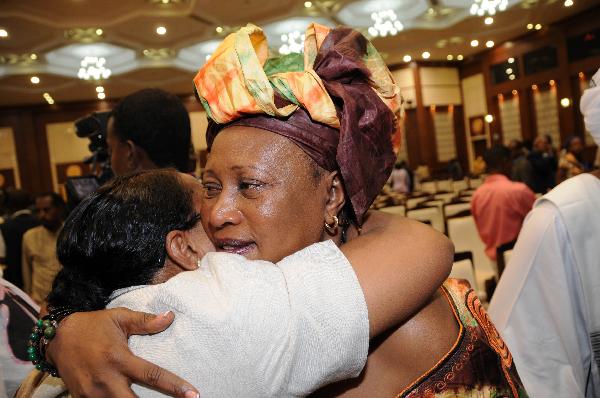North, south Sudan ties enter new phase
With the announcement of the final results of the south Sudan referendum that lead to the separation of the region, the relationship between north and south Sudan entered a new phase amid challenges and barriers that would test the peace between north and south Sudan.
 |
|
A woman from south Sudan embraces with another woman at the press conference in which the final results of the south Sudan referendum was announced in Khartoum, Sudan, on Feb. 7, 2011. |
For about five months, north and south Sudan need to agree on many thorny issues, such as the post-referendum issues and the difference over the country's oil-rich Abyei area.
Despite the difficulties, observers bet on the political will of the National Congress Party (NCP) and the Sudan People's Liberation Movement (SPLM), which are signatories to Sudan's Comprehensive Peace Agreement (CPA), to accomplish the most difficult file in the peace agreement, namely the south Sudan referendum.
In this respect, Sudanese political analyst Abdel-Rahim al- Sunni told Xinhua that "it was impressive to see south Sudan referendum conducted in a peaceful atmosphere and a way from violence. Most importantly the recognition of the referendum result despite the fact that they led to separation of the region. "
"We relay on this positive and constructive spirit and we think the two partners have the same will to resolve the outstanding issues despite their difficulty and despite shortness of the less- than-five-month transitional period," he added.
The most prominent outstanding issues between the two sides include security arrangements, the borders, oil revenues and their distribution within the framework of natural resources, nationality, external debts, status of the southerners living in the north and northerners in the south, water and status of the joint integrated units.
Al-Sunni affirmed that the security arrangements item was the most complicated, saying "now after the referendum results, the CPA stipulates demobilization of the joint integrated units as they can trigger security tensions."
He went on saying that "in the past two days, armed clashes took place in Malakal when one of military integrated units rejected to be deployed in the north. This incident indicates the possibility that the security arrangement could lead to real problems."
Sudanese analyst Izz-Eddin Mussa, for his part, stressed the importance of paying attention to the consequences of separation and not to neglect the security aspects and whatever may trigger tensions, affirming the importance of preventing the area against interventions that could harm the interests of north and south Sudan.
"North Sudan's recognition and acceptance of the new state will be an indicator of a good diplomatic relationship between the two states. Normal ties can be established on bases of good neighborliness," Mussa told Xinhua.
"The two sides should expand their relationship, coordinate at the external level, work to sustain peace, prevent the area against interventions, tackle the issue of the joint borders, assimilate the northern Sudanese military men who are under the command of the Sudan People's Liberation Army (SPLA) and exchange experiences in the different fields," he said.
"North Sudan constitutes the proper gateway for south Sudan than other countries and to jointly utilize this matter, the two sides need to strengthen the bonds between them and resolve all the outstanding issues that could disturb their relation," he said.
Mohamed Abdul-Muti Satty, a political analyst, for his part, told Xinhua that there were a number of "hazards" as a result of separation of south Sudan that would impact the two states.
"At the level of south Sudan, the newly born state will lose its share in the standing infrastructures in north Sudan, which will shoulder the south with the burden of establishing new basic institutions that will cost billions of dollars," he said.
Regarding the hazards which would face north Sudan, Satty said "separation of south Sudan will further complicate issues in other areas in Sudan, particularly Darfur, Kordofan and eastern Sudan."
"Furthermore, separation of south Sudan will prevent north Sudan from direct communication with eastern Africa and from playing its forthcoming role as a bridge for the Arab and African culture," he said.
The referendum results showed that 98.83 percent of the voters have voted in favor of south Sudan's separation from the north while 1.17 percent voted for unity, and that the total number of the voters reached around 4 million.
 0
0 







Go to Forum >>0 Comments